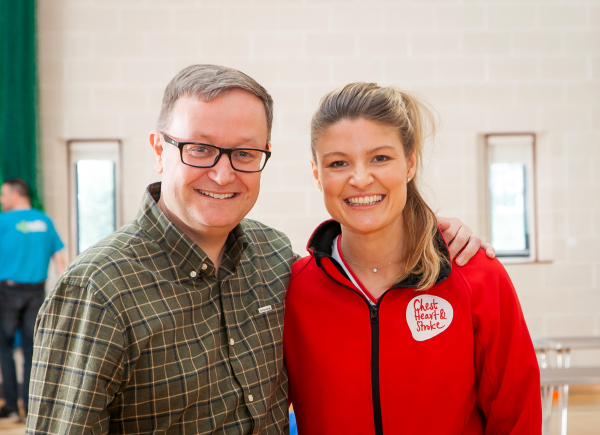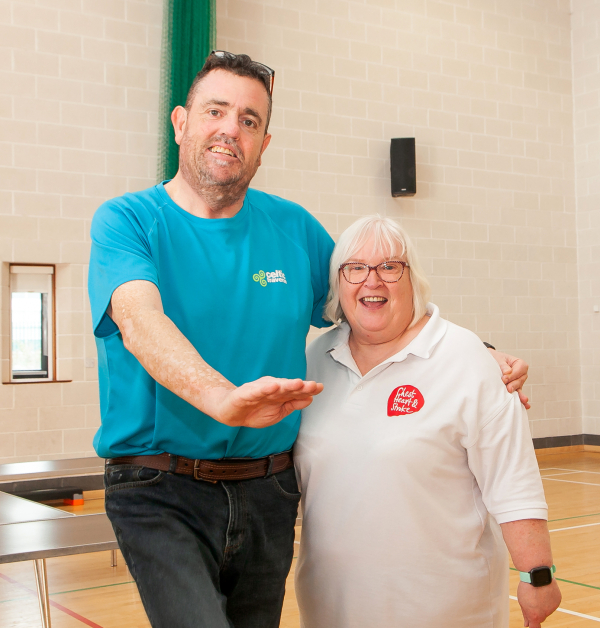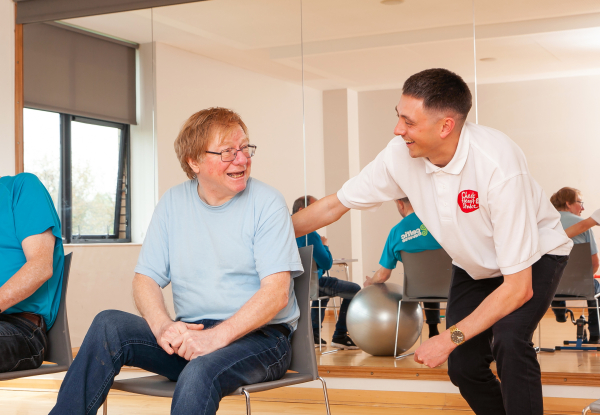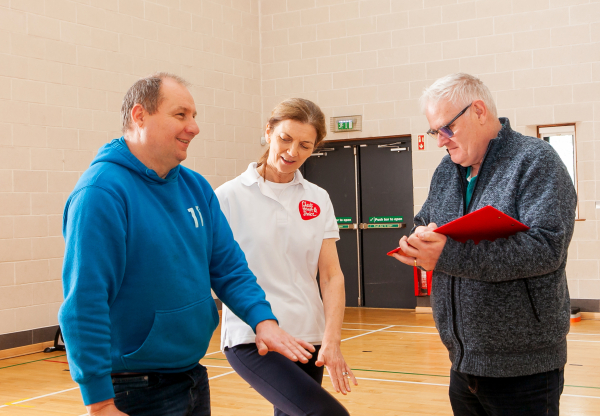As Men's Health Week commences, leading local charity Northern Ireland Chest Heart and Stroke (NICHS) are sharing the fact that every day in Northern Ireland, around 4 men are admitted to hospital for a stroke. The effects of a stroke can be life-altering and isolating, particularly for males affected who may be less likely to seek emotional support once released from hospital. However many survivors are able to find solace, support, and a path to recovery through the charity’s Post Rehab Exercise Programme (PREP). To mark Men’s Health Week 2023, five local men who met at the charity’s Craigavon PREP programme, all from different walks of life but having stroke recovery in common, are sharing their stories.
PREP stands for Post Rehab Exercise Programme and is a service designed to provide additional support for stroke survivors after their statutory rehab has ended. Aimed at helping stroke survivors to rebuild their life and gain confidence following a stroke, PREP does this through a combination of education and physio-developed exercises. The service is delivered in all five Trust areas in communities across Northern Ireland.

Philip Annett
Philip Annett, 49 from Portadown, was in the middle of a short career break from his work, which often saw him travelling across the world to destinations including the Philippines and South Korea, when he had a sudden stroke on the 22nd of October 2022.
Philip recalls, “My 16-year-old son Ethan and I were down in Lisburn building a fence at my mother in law’s house. After lunch, I knew I didn’t feel well. I felt like I had a dizzy head, although it wasn’t a normal dizziness. I thought it would get better, but it didn’t go away.”
“Ethan was asking me, ‘Are you okay?’ but I couldn’t reply back to him because my speech had gone. Thankfully Ethan knew straight away it was a stroke and got me inside the house and phoned for an ambulance. He was told it would take 2 hours and it would be quicker to get me in a car if possible, so my wife Denise helped me into the car and drove to Craigavon.”
“They scanned me and found out I had a clot on my brain caused by a dissection in the left carotid artery. I received the clot busting drug Thrombolysis and was then blue lighted to the Royal where the team were waiting to bring me into surgery. There were several people in that team, nurses, and surgeons, who came in late on Saturday afternoon when they weren’t on duty. It’s amazing that those people, who didn’t know me, came in of their own free will to treat me. I had a Thrombectomy which saved my life.”
“As I was wheeled back towards the recovery ward, I put my thumbs up to my wife and was trying to speak to her which was amazing as just before the surgery I had no comprehension and couldn’t communicate at all. Now I was starting to speak and understand again.”
By Monday, Philip was walking around with physios and was discharged back to Craigavon Hospital. He started Speech Therapy and was classed as having moderate to severe aphasia and dysphasia. Aphasia is when a person has difficulty with their language or speech, and dysphasia means an impaired ability to understand or use the spoken word.
Philip says, “My mobility was okay at that stage, my speech was the main problem. I could say words when looking at a picture, like dog or cat. I also had to work on my writing and reading – even now, I would still struggle a bit with reading a book. I was then transferred to Loane House in Dungannon and received speech therapy around 3 or 4 times that week. When I was discharged the speech therapists continued to visit me at home. My speech got better then really quickly.”
“I would say the hardest part of my struggle was actually from there on. You would think everything was back to normal - my speech and mobility were okay - but I was out of routine, not working and I didn’t know what to do with myself. Anxiety played a big part and still does, although I’m getting a lot better. After you’ve had a stroke, when you have any little pain or twitch, you think, is this another stroke? It was the lack of confidence that really affected me.”
“The NICHS PREP programme really helped. When I first went, I was like a rabbit in the headlights. I was thinking, if I do too much will I have another stroke? Having that reassurance from Zoe and Rita from NICHS was the key thing. They gave you that gentle push along, or the tough love with a smile on their face, when you needed it.”
“It gave you a reason to get out of bed in the morning. You were meeting people who have been through the same thing and are in the same boat. The follow up on a personal level was so important – to have people that were interested in you, in where you were at, the level of progress you were making, and where you could get to was so important. The NICHS team are bright, positive and willing to listen.”
Philip is now aiming to return to work. He does not want to let his stroke define him. He says, “My stroke is part of my story and always will be, but my story is not over. I don’t want to be identified as a ‘stroke survivor’ or someone to feel sorry for – I’m just Philip. Everybody goes through difficult things in their lives. It’s important to talk about it openly, but you have to try and build back what was normal too, the things that you enjoy, and then move forward.”
“It’s not the end, it’s the beginning of a life that might be slightly different, but it’s still a life that’s worth living.”

John Power
John Power, a father of five from Portadown, suffered a stroke in March this year aged just 56. The former pub owner is now recovering and aiming to get back to work.
John recalls, “I can tell you exactly what happened when I had my stroke. At six minutes past four in the morning on the 23rd of March, I woke up and felt a bit strange. I tried to ask Google what time it was and I realised my speech was not coming out right. I live on my own, so I rang one of my sons and asked, ‘do I sound right?’. He said you sound like you’ve been drinking, which I hadn’t, so then I knew something definitely wasn’t right.”
“My former partner brought me into the hospital, and I can’t remember much after that - she had to fill me in. But I do know I got A star treatment from the NHS.”
“My speech, my memory and a wee bit of my eyesight were affected. I had no balance at all and couldn’t walk without falling over to the left side. My speech now is getting there but it’s still not 100%, and I also have a swallow problem. I would take a drink and cough for ages because it doesn’t go down right. I also suffer from fatigue. I can get up in the morning feeling great and sparky but then after going for a walk around the shop I feel exhausted. It also knocks your confidence – for the first two months after the stroke, I was scared every minute of the day of having another.”
John started attending the NICHS Craigavon PREP Group. “Just having somewhere to go where nobody is judging you and everybody is in the same boat is great. We do easy exercises that you can do at home, and seeing your ability increase gradually each week is brilliant. Now I walk around 2 miles most days.”
John also took part in the charity’s ‘Return to Work’ programme for those looking to get back into employment following a stroke or heart attack or a chest or heart diagnosis. “The comradery was great, and the course provided loads of information and introduced us to useful contacts, like Gareth who could give us advice on benefits. It was a brilliant programme.”
“The follow up support from NI Chest Heart and Stroke has been superb. They told me what to do and the changes I needed to make to my lifestyle to move forward. Now I’m trying to eat healthily, and be more active, I’ve stopped drinking soft drinks and alcohol, and I’m starting a stop smoking programme, all thanks to the advice of NICHS. Now I know the things I need to do to get back to normality when I’m ready.”

John Stewart
John Stewart from Donacloney had been retired from his career as an IT Systems Architect for 2 years when he had a stroke on the 16th of November 2022, aged 69.
John says, “I had washed the dog earlier that day and used anti-parasite shampoo. Afterwards, I started feeling strange and off-balance, and thought it was a result of the shampoo. I sat down to watch TV for a while, but by six o’clock I had to stop as it was out of focus. I told my wife Geraldine I was going to bed. At 9pm I was up and threw up, then went back to bed. Around 1am my wife came to bed, and I had to move to give her space to get in. I lifted my leg, but it was heavy. I raised hand to my head, and it was also heavy. My ear and my scalp felt numb. That was when I realised, we need to go to hospital.”
Following his stroke, John lost power in his hand and foot, but has returned to having reasonable movement in both. “I can walk reasonably well but not for long distances as I get very fatigued. I get up in the morning and get dressed and I’m knackered and feel like I could go back to bed!” He also suffered Autonomic Nerve Damage as a result of his stroke. “I tend to get hiccups, itches, yawns, and I can’t stop. It can go for about 10 or 15 minutes, then I get relief for a couple of days, but then it starts again.”
“I’m not confident enough to walk without the stick as my balance is not the best, but PREP has been brilliant. Rita the physiotherapist at the group has been getting me to walk backwards and turn to improve my balance, and she and the other NICHS staff are there to make sure I don’t fall. It really has helped my confidence.”
The charity also fund research in local universities in Northern Ireland to work to find new and improved ways to treat, care for and prevent chest, heart and stroke illnesses. John says, “I’ve also taken part in a research study by Ulster University which is funded by NI Chest Heart and Stroke called Grasp. This involved trying out a new programme of physio exercises alongside our usual PREP to strengthen your arms and limbs. It’s been very beneficial to my feet, posture and my shoulders which can be very stiff.”
The social aspect of the group was also a lifeline for John. “When I came out of hospital, I was completely housebound. Meeting other people and hearing how others have gotten around their problems is invaluable. I don’t think anyone has a bad thing to say about the group.”

Cecil Wiltshire
Cecil Wiltshire had a stroke in October 2022 aged 59. At the time, he lost power in his right leg and arm and had slurred speech. He regained some of his mobility slowly, but still lives with some right sided weakness.
“When I first went along to PREP, I was barely walking. After my 12 weeks, I’m walking a whole lot better, standing up straighter and could do all my exercises. As time went on, it got easier and better. I’m still not at 100%, I can’t walk without my stick and need to use a Zimmer frame at times, but I have improved 100% compared to where I was.”
“It was also brilliant meeting others and socialising as I would usually see no one. Seeing how they have been similarly affected – you count yourself lucky based on what you can do. The NICHS staff want to work with you and they’re very helpful. It’s very worthwhile.”
Raymond Lavery
Raymond Lavery from Magheralin, who previously worked as a taxi driver, was 57 when he had a stroke. He lost power in his left side and was in hospital for around five days. After attending the NICHS PREP programme, he now volunteers his time at the group to support others through the process.
Raymond says, “One of the physiotherapists recommended I get support from NI Chest Heart and Stroke. Shortly after Lynn, the local NICHS co-ordinator, came out to house to speak to me about my stroke. She told me there was a PREP group coming up soon, so I went along. I was a bit nervous at the first one, but once I went, it was great. The NICHS team give you so much encouragement. The exercises we do, even though they’re simple, they do bring you on greatly. During the 12 weeks, you could see a massive improvement in others in the group, not only physically but in their confidence, too. The kindness of the people in the group, not just the staff but the others attending the group, was amazing. You would say I have this pain or this effect, and others would say they’ve experienced the same thing, so it was great for finding out you’re not on your own.”
“We also have a talk each week where we are taught about what a stroke is, about different topics like health, fatigue, and life after stroke. When you’ve never had a stroke before, you don’t know anything about how it affects you or how it works so it was extremely helpful and very interesting. I would recommend PREP to everyone affected by a stroke.”
Andy Bell, an NICHS Care Services Co-ordinator, is responsible for running some of the PREP programmes in place across the province. Andy says, “PREP is a community-based course to give stroke survivors the time and a place to come to re-build their physical and emotional strength following their stroke. Personally, it is very rewarding to see the participants progression from joining the group in week one to when they complete the programme in week six or twelve.”
“From my experience, PREP not only helps people to rebuild physically following stroke, but has massive benefits to the participants emotionally and socially. PREP is a safe space for stroke survivors to share their experiences following their stroke and open up about difficulties they have encountered. I have realised that males are more reluctant with these aspects of their recovery due to the vulnerability associated with sharing these experiences, yet often I see the biggest positive change in these individuals. These sessions bring a sense of community, trust, enjoyment, and friendship to the group which leads to the development of a support network post-PREP. . Men's Health Week serves as a timely reminder of the importance of addressing and supporting men's health concerns.”
Andy continues, “PREP would not be possible without the amazing participants, volunteers, physiotherapists and NICHS staff who put in the time and effort to the groups. As a charity, it is also thanks to the public and local people in Northern Ireland that we can be there for people who need us as almost 90% of our work is funded by donations. I would like to thank everyone involved in this life-changing programme.”
To find out more about Northern Ireland Chest Heart and Stroke’s work and the support they offer, or to make a referral to get support, visit www.nichs.org.uk.
